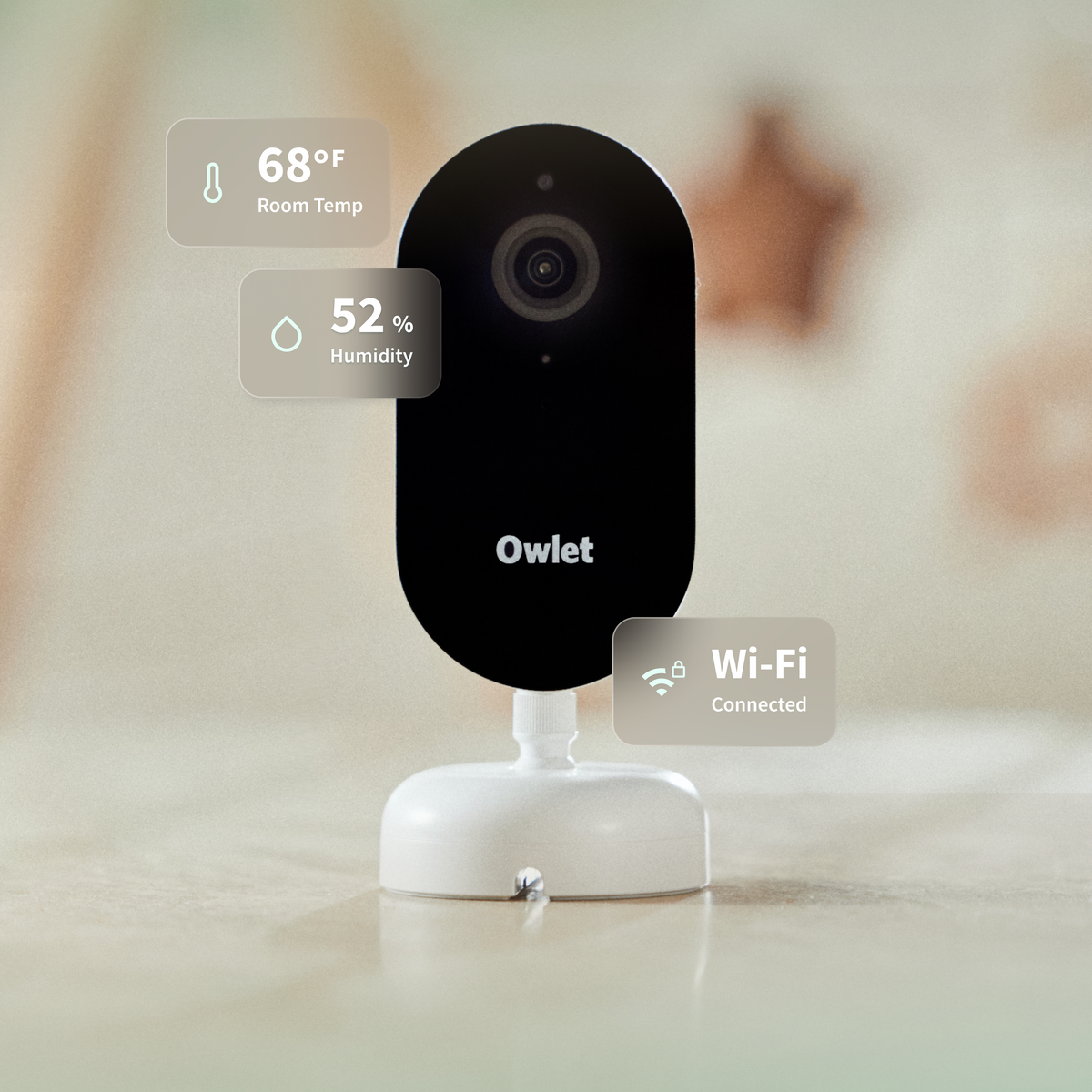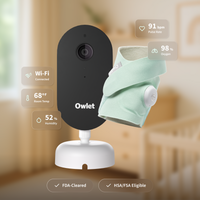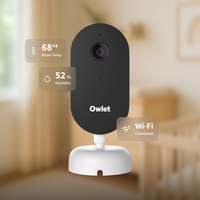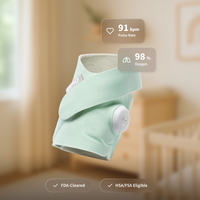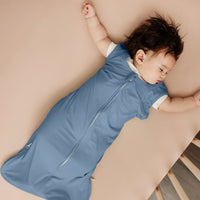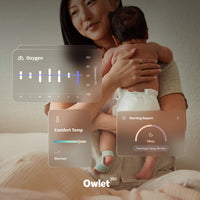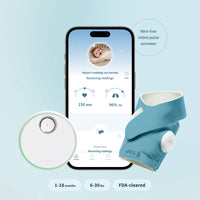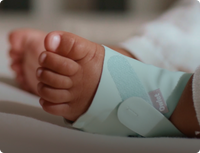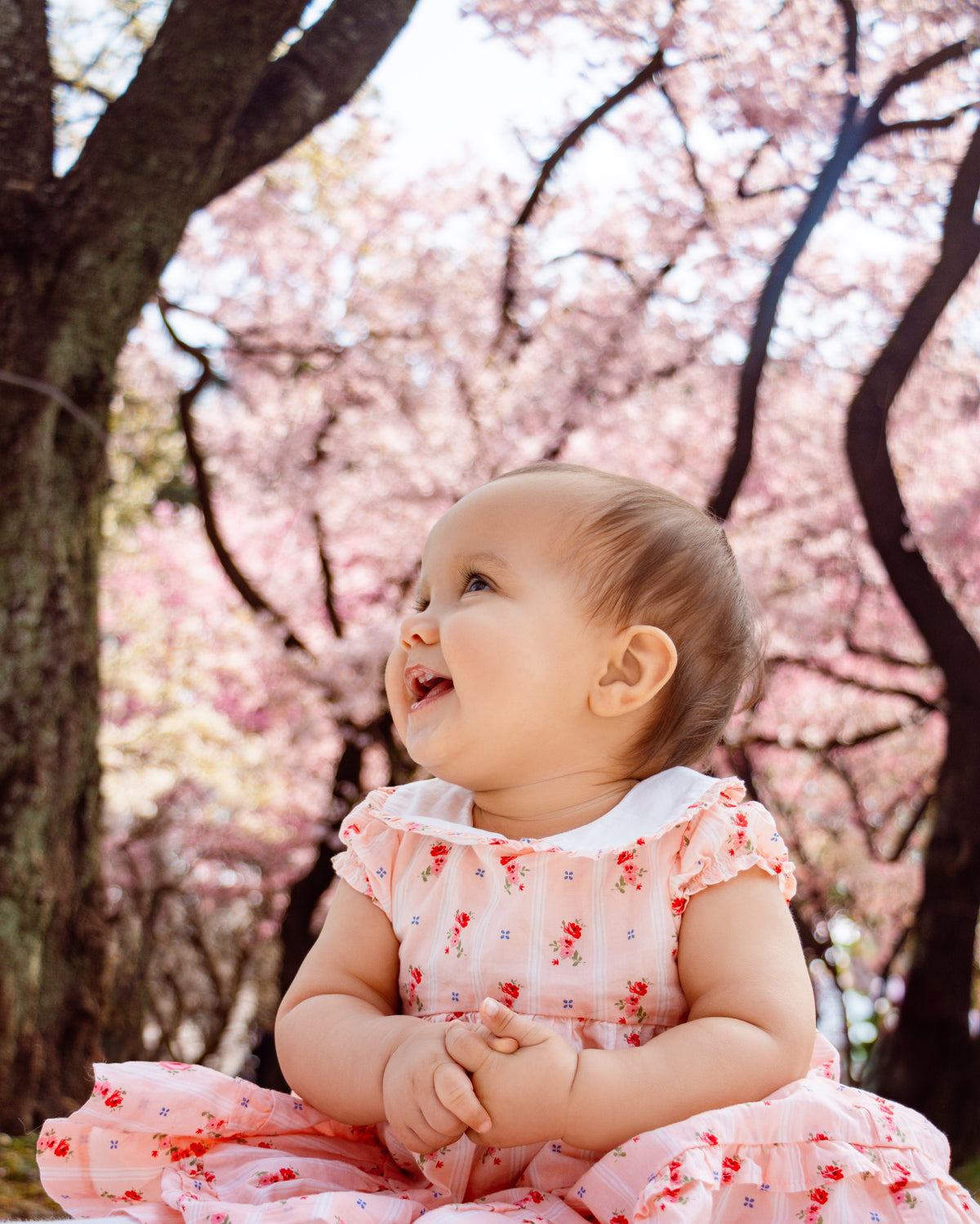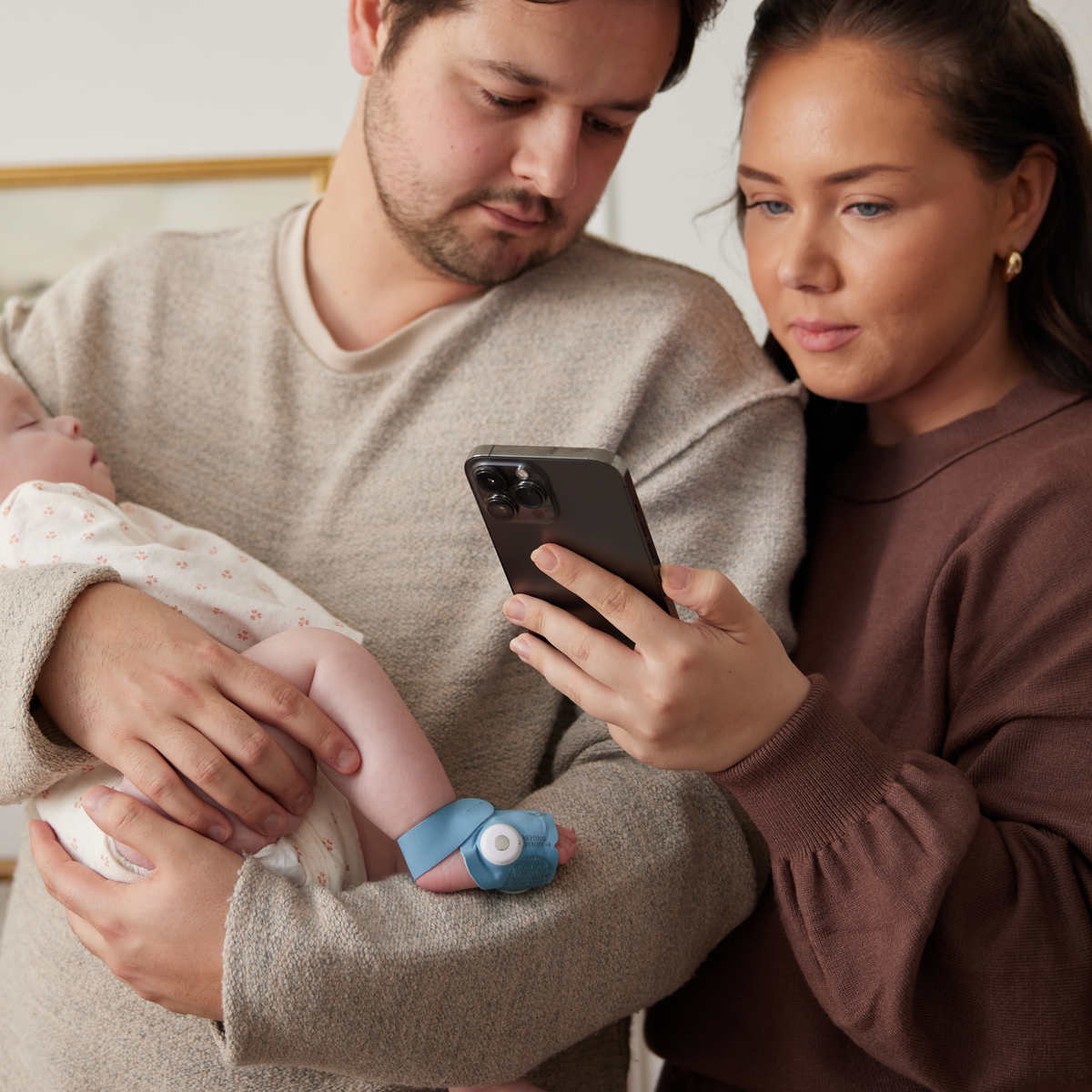Rainbow Baby Day: A Spotlight on Pregnancy After Loss Support

Owlet Cares is our advocacy initiative that is dedicated to making a positive impact in the lives of babies and parents.
One way we do this is by partnering with nonprofits all over the world who share our mission. These groups participate in our 3:1 match program. When they purchase one Owlet product, we match it with two, meaning three families are reached.
Each month, we shine a spotlight on one of our foundation partners and the important work they are doing.
This month, in honor of National Rainbow Baby Day on August 22, we are proud to spotlight Pregnancy After Loss Support - an organization with a mission dedicated to ensuring that every mom and her partner who is experiencing pregnancy after loss is able to find support and connection among both peers and health care professionals who understand and validate the unique and complex experience of pregnancy after a previous perinatal or child death.
In their words, here is more about their program.
By: Valerie Meek
“Pregnancy after loss is the hardest thing I've ever done after losing my child.”
- Lindsey M. Henke, founder of Pregnancy After Loss Support
About Pregnancy After Loss Support (PALS)
After a full-term healthy and normal pregnancy, Lindsey Henke arrived at the hospital in labor at 40 weeks 4 days pregnant, only to hear the dreaded words, “I’m sorry, there is no heartbeat.” She gave birth to her daughter, Nora, the following day and plunged into deep grief. When she became pregnant again several months later, she felt anxious and alone in her experience. She felt like she didn’t quite fit in the loss community or the normal pregnancy community. After the birth of her second daughter, Zoe, she founded Pregnancy After Loss Support to give parents a place where they could hold both grief and joy, hope and fear during their pregnancy that follows a loss.

(Lindsey Henke and her family)
In the United States, pregnancy loss is a heartbreaking reality for many families. Every year, 1 in 4 pregnancies end in miscarriage, 1 in 173 in stillbirth, and 1 in 185 infants die before their first birthday. Despite these staggering statistics, 50-80% of women who experience perinatal loss will try to conceive again within 12-18 months. This journey is emotionally complex, and PALS is dedicated to providing essential community support and resources to these parents.
PALS began as an online magazine ten years ago and has evolved into a 501(c)(3) nonprofit offering a range of support services. The PALS community relies on online support groups, in-person meet-ups, healthcare provider education, and our one-of-a-kind Pregnancy After Loss App. Recognizing a critical need, our community rallied together to fund the development of the app, even though many would never use it themselves. Their selfless act ensures future parents have access to the support they desperately need.
The Pregnancy After Loss App offers a unique approach to pregnancy updates, acknowledging the complex emotions of joy and grief that often coexist. Through meditations, affirmations, and coping skills, the app helps parents navigate challenging moments and connect with a supportive community. With over 28,000 users, the app has become a lifeline for countless parents on their journey after loss.
After Pregnancy After Loss
Pregnancy after loss is so anxiety-filled, and parents feel as if they hold their breath through the entire pregnancy. Many parents get through pregnancy after loss and deliver their healthy baby and expect their anxiety to dissipate. So, when they experience further grief and anxiety, it can catch them off-guard. There can also be triggers throughout the postpartum experience. And for those who expected to feel joy and relief after birth, there can be feelings of guilt for feeling anything other than joy and happiness. PAL parents are also at higher risk for perinatal mood and anxiety disorders, so continued support after the birth of a subsequent baby is vital.
Tips for Coping during Postpartum
The fourth trimester can be just as important and challenging as the trimesters before it, and this aspect is not discussed nearly enough. The following are suggestions from our community about what they wanted and needed during their postpartum recovery:
- Rest. It is probably no surprise to find that rest tops our list of must-haves in the postpartum period. After all, newborns are notorious for being poor night-sleepers. Of course, you want to get enough shut-eye at night. Decent sleep is physiologically necessary for healing. Also, you want to experience the kind of rest when your whole body feels safe enough to completely let its guard down, when your mind stops racing, and when you can let go of the need to be hypervigilant. This is also the kind of rest that can help you heal. Many in our community have found the Owlet Dream Sock to be an invaluable resource for getting rest and knowing that baby is safe.
- Space and community. Some parents report needing a lot of space after birth, while others desperately craved community. You will need to balance each day what you need more: company, help with managing your other responsibilities, or simply a sacred space to be.
- Bonding time with your baby. Your need for bonding goes deeper when you’ve previously lost. You may find that when you look at your sleeping child you see the visage of your baby gone-too-soon. You might be triggered by every milestone you are reaching with this child that you didn’t with your other child. It can be incredibly hard at some points to differentiate between your joy for this baby and your grief for your other baby. But both you and baby deserve the space to figure out this sacred dance of learning and loving each other.
- Respect for your grief. No child can replace another. Like in pregnancy, being a mom to this baby continues to be a balance of being grateful for the child in your arms while mourning those who are not. You have the right to feel more than one thing at a time. And you deserve the respect to safely express to others your joy and pain. Yes, you are celebrating. But you will always be a loss mom. Those around you need to support you in both. And you need to allow yourself to feel whatever it is you need to feel without judgment.
- Tangible support. As mentioned before, but you deserve to have some help. No mother should have to do it all. And it can be incredibly hard to rest or to bond when you know other responsibilities are suffering. Now is the time to embrace as much support as you can.
- Professional support for postpartum mental health. Being a postpartum mom with a history of loss can put you at increased risk of postpartum depression, anxiety, or trauma. It can be hard to figure out what is just baby blues, what is grief, and what is depression. To help you sort through if you need additional mental health support, be sure to tell your provider what you are feeling. No one is there to judge you, only to offer you the support you need.
- Grace. Offer yourself a lot of grace during this new season of parenting. You and baby are doing so much work – from learning to read each other’s cues to developing a life-long bond – and this is not always easy or natural. There will be lots of tears (and not just baby’s) and missteps and regrets. But this is about learning and developing – not performing or perfecting. With a little bit of humor and a lot of grace, this postpartum period can be one you’ll look back on with fondness.
How Owlet Helps those Parenting their Babies Born After Loss
Many in the PALS community have turned to Dream Sock® to help them cope with the anxiety they continue to feel as they parent their baby born after loss. When we asked our community to share their experiences with an Owlet smart baby monitor, the overwhelming message we heard was that the Owlet smart baby monitors gave them much-needed peace of mind and the ability to sleep.
Courageous parent Amanda shared about her experience with Dream Sock.

(Amanda F and her girls; Photo credit: Willow and Wren Photo)
“I’m often asked how I feel about the Owlet smart baby monitor. When I was pregnant with Juniper, blissfully unaware of the trauma and tragedy of infant death, I’ll be honest that I thought a baby monitor like this was ‘over the top.’ Then Juniper died and was born at full term, and the death of your child has a way of taking off your rose-colored glasses and flipping your world upside down.
“When we were pregnant with Coral, we purchased an Owlet smart baby monitor. We actually didn't start using it until she was about 3 months old - she was such a loud breather! We could hear her breathing in our room from the bottom of the steps! Literally hearing her breathe helped me have so much less anxiety.

(Photo credit Amanda F./@orangeafmama)
“My third daughter, Jersey, has been a whole new story. She is the quietest breather I’ve ever met! Our night in the hospital when she was born was actually super tough for me, as the silent room took me right back to the one night we spent with Junie outside my belly. I started using the Owlet monitor on her sooner than her siblings.

(Photo credit Amanda F./@orangeafmama)
“I feel that using a tool like this should enhance your parenting. It should never subtract. The Owlet smart baby monitor is not an excuse to blur the line on unsafe sleep practices or to replace visiting your pediatrician. It is not something I totally rely on to tell me my living baby is breathing; if there’s ever an actual concern, baby gets physically checked on. I had to tell myself early on to not fixate on the numbers but to take them with a grain of salt. I've been pleasantly surprised at how helpful the sleep tracker part (think of it like a *Fitbit® if you’re not familiar) has been to look back on, especially when I’m super sleep-deprived, and I can’t remember how the night went. This was really a nice feature to use when we sleep-trained Coral.”
Amanda has shared so much of her loss, pregnancy after loss, and parenting after loss journey with the community. She so meaningfully includes Junie in their daily family life, and we loved to see that she even includes Junie in her Owlet App so she can see all three of her girls there.
PALS is honored to partner with Owlet because we know how important peace of mind is for families who are parenting after loss. We are grateful for their support of PALS and the loss community.
Author Bio:
Valerie Meek is the Operations Director for Pregnancy After Loss Support. She lives in a Boston suburb with her husband, daughter, and Sato puppy, Didi Darling. She became a mama when her son Patrick was born still at 20 weeks in April of 2014. She has been honored to share her TTC and pregnancy after loss journey at PALS and to support parents through their journeys.
Disclaimer: The quotes, stories, and experiences included here are those of the individuals and are not representative of Owlet's views or claims about our product. Individuals were not paid and did not submit their information as part of any paid promotion by Owlet.
The content provided on this health blog is intended for informational and educational purposes only. It is not a substitute for professional medical advice, diagnosis, or treatment. Always seek the advice of a qualified healthcare provider with any questions you may have and to learn more about your child's specific needs.
Fitbit® is property of Fitbit LLC or its affiliates. Other trademarks and trade names are those of their respective owners.
